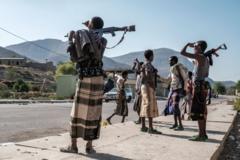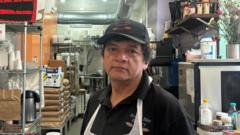Ethiopia is celebrating the start of its new year - 2018. The country has its own unique calendar, meaning it is seven years behind the Western calendar.
These yellow adey ababa blooms are associated with the celebration. They grow wild around the capital, Addis Ababa, at this time of year. Small bunches have been selling for around 50 Ethiopian birr ($0.35; £0.25).
The seven-year gap comes down to the fact that the birth year of Jesus Christ is calculated differently in Ethiopia. When the Catholic Church amended its calculation in 500 AD, the Ethiopian Orthodox Church did not.
The celebrations - known as Enkutatash - are not tied to the church, and for everyone in the country it is a time to celebrate. Here vendors in Addis Ababa come in from the countryside to sell adey ababa and also freshly cut grass - both of which are used during traditional coffee ceremonies.
The birthplace of coffee is widely considered to have been in the highlands of Ethiopia. The grass and flowers are used as decoration for the ceremonies during which the beans are roasted over an open fire, ground and then brewed in a clay pot.
Shopping areas, including the market of Addisu Gebeya, were heaving in Addis Ababa on New Year's Eve, despite the rain - as people rushed to prepare for the celebrations.
Families tend to gather and invite friends to join them for a Enkutatash meal either at lunch or in the evening - or both. Some even slaughter an oxen, which can cost up to 300,000 birr ($2,000; £1,550).
On New Year's Day morning a traditional song known as Abebayehosh is heard around the city - usually performed by young girls for passers-by. Orthodox Christians continue in that spirit later in the day with church services.
This year there has been a greater sense of unity and pride as the week began with the formal launch of the Grand Ethiopian Renaissance Dam (Gerd), which has been built on a tributary of the River Nile.



















